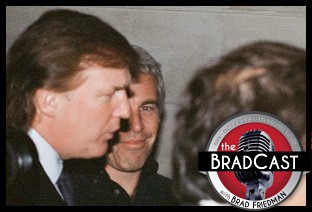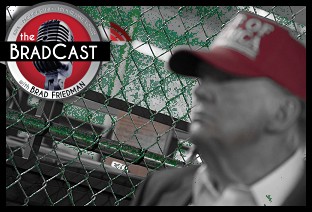READER COMMENTS ON
"Harry Reid's Failibuster"
(18 Responses so far...)
COMMENT #1 [Permalink]
...
Sam
said on 1/24/2013 @ 1:24 pm PT...
Last sentence of post = AMEN to that.
COMMENT #2 [Permalink]
...
Randy D
said on 1/24/2013 @ 2:14 pm PT...
Not for the first time I wonder if the Republicans deliberately engineered Reid's re-election, because a 60-40 Senate led by the cowardly appeaser is better for them than a 59-41 led by someone with a spine and a conscience.
COMMENT #3 [Permalink]
...
Ernest A. Canning
said on 1/24/2013 @ 2:37 pm PT...
If this goes through, it will be proof that the words "Senate Majority Leader" as applied to Harry Reid is an oxymoron.
COMMENT #4 [Permalink]
...
David Lasagna
said on 1/24/2013 @ 4:16 pm PT...
Are Leahy and Boxer really against filibuster reform? Here(in the last few minutes of this clip)is Leahy sounding very much in favor of reform. http://www.youtube.com/watch?v=rmRqTsqZy5M
And I've seen Boxer on Rachel also speaking strongly for reform of the filibuster. Are they saying one thing and then acting differently? Where's the evidence these two longstanding liberals are against this obviously crucial/necessary reform?
I'm ready to revise my views, again, that we're even fucking crazier than I thought, but I'd like some evidence before I do.
COMMENT #5 [Permalink]
...
christy
said on 1/24/2013 @ 4:32 pm PT...
The Senate Majority leader's epic fail at filibuster reform will provide 'political cover' for Democrats on legislation ranging from gun laws, to climate change legislation, to keystone xl.
COMMENT #6 [Permalink]
...
Alex
said on 1/24/2013 @ 4:41 pm PT...
So much for any chance at Climate Change, Immigration reform, further banking or healthcare reforms, etc.
The reason Ried felt he couldn't pass a tougher filibuster reform is that the conservative Dems don't want to undermine their power broker status. It's more impoortant they continue to be deal makers/breakers than the country is able to accomplish anything beneficial.
COMMENT #7 [Permalink]
...
Paul Kuhar
said on 1/24/2013 @ 6:19 pm PT...
I have supported you for years.....however now all I can say is YOU HARRY REID ARE PATHETIC!! You have been bought out by the NRA and the tea party Republicans!! HARRY REID YOU HAVE SOLD OUT!! Now go spent time with your SOLD OUT BUDDY JOHN McCAIN!! I also used to support McCain but never again!! Your other new buddies Mitch & John Boehner make you a TURNCOAT!!!
COMMENT #8 [Permalink]
...
WingnutSteve
said on 1/24/2013 @ 7:09 pm PT...
He didn't sell out anything. Better to have the filibuster threat holding up legislation than to have to take responsibility for the legislation. Now he again has Republicans to blame for inaction on legislation he doesn't want in the first place.. David Swanson was absolutely correct IMO.
COMMENT #9 [Permalink]
...
David Lasagna
said on 1/24/2013 @ 7:39 pm PT...
Steve, for once, I am in agreement with you. Maybe anything is possible(except filibuster reform this year).
COMMENT #10 [Permalink]
...
Brad Friedman
said on 1/24/2013 @ 8:18 pm PT...
David Lasagna @ 4:
Are Leahy and Boxer really against filibuster reform? ... And I've seen Boxer on Rachel also speaking strongly for reform of the filibuster. Are they saying one thing and then acting differently? Where's the evidence these two longstanding liberals are against this obviously crucial/necessary reform?
First, my understanding is that Leahy and Boxer were named by Merkley during that phone call last week, as reported by Politico.
Secondly, I believe (but would need to go back and check) that Leahy had an alternate, more "moderate" proposal to Merkley's. Leahy's wouldn't have required the "talking filibuster", but it would have reformed the filibuster to put the burden on the minority, rather than the majority, by forcing them to come up with 41 votes against cloture, rather than requiring majority to come up with 60 in favor of cloture. Pretty tepid, and Reid wouldn't even go for that option, because it would have to have been done with a 51 vote majority (the "constitutional option" or "nuclear option", depending on whose describing it), rather than via unanimous consent as the Reid/McConnell deal was done.
COMMENT #11 [Permalink]
...
SickInCo
said on 1/24/2013 @ 8:33 pm PT...
Filthy, filthy cowards, the Democrats. Never again--I am voting Green until the DLC and these puke cowards are purged from the Dem Party.
You damned, filthy cowards.
COMMENT #12 [Permalink]
...
zapkitty
said on 1/24/2013 @ 9:12 pm PT...
... and the first trial balloon sent up afterwards was Schumer on SS and Medicare cuts.
Reid is performing his job quite ably.
It's just too bad that he works for the elites instead of the lesser people who actually voted him into office.
COMMENT #13 [Permalink]
...
Ernest A. Canning
said on 1/24/2013 @ 10:36 pm PT...
I don't know about Boxer, David Lasagna, but here's a segment of a letter I received from Sen Feinstein in response to my email asking for meaningful reform:
All those words to essentially say nothing will change.
COMMENT #14 [Permalink]
...
David Lasagna
said on 1/25/2013 @ 7:49 am PT...
Yeah, Feinstein I'm not surprised by. Boxer and Leahy I would be. Swanson's interpretation sure looks like it has merit.
I never cease to be amazed(and in turn bitterly disappointed)by what looks for all the world to be a suicidally bubbleheaded view of reality by the vast majority of Washington congress people (and the fawning media who serve them) which time and again seems to preclude putting up any meaningful resistance to truly insane and truly minority worldviews.
COMMENT #15 [Permalink]
...
Irwin Mainway
said on 1/25/2013 @ 10:24 am PT...
NOW when a Republican Senator disagrees with a bill costing a large corporation over $150, he actually has to appear on the floor and hold it up with a sneer.
Before yesterday the good Senator could sit in conference with lobbyists and a big bag with a $ sign on the table, then just send a note over to Reid.
COMMENT #16 [Permalink]
...
Elliott
said on 1/25/2013 @ 12:37 pm PT...
If we're not willing to remove money from elections, we deserve 100 Harry Reids in the Senate, 435 John Boehners/Boners in the House, and 1 Barrack Obama in the White House.
It really is that simple.
COMMENT #17 [Permalink]
...
David Lasagna
said on 1/28/2013 @ 9:13 am PT...
According to wikipedia the "silent" filibuster was introduced in 1975 by a democratic congress. Does anybody know if that's correct? Why was the silent filibuster ever introduced?
COMMENT #18 [Permalink]
...
Colinjames
said on 1/28/2013 @ 10:33 pm PT...
Changing my voter registration from D to Whig. Because my hair caught fire and I'm not one for the bald look. But really. Done. No more D for me.
 The one thing the Senate Majority Leader never seems to fail at: Failing.
The one thing the Senate Majority Leader never seems to fail at: Failing.

 A Pu Pu Platter of Trump Corruption: 'BradCast' 7/29/25
A Pu Pu Platter of Trump Corruption: 'BradCast' 7/29/25  'Green News Report' 7/29/25
'Green News Report' 7/29/25
 GOP Cuts to Medicaid, Medicare, ACA Could Trigger 'Catastrophic' Crisis This Fall: 'BradCast' 7/28/25
GOP Cuts to Medicaid, Medicare, ACA Could Trigger 'Catastrophic' Crisis This Fall: 'BradCast' 7/28/25 Sunday 'Pedo Files' Toons
Sunday 'Pedo Files' Toons Landmark Climate Ruling at World Court; More Epstein Trouble for Petty Little Tyrant: 'BradCast' 7/24/25
Landmark Climate Ruling at World Court; More Epstein Trouble for Petty Little Tyrant: 'BradCast' 7/24/25 'Green News Report' 7/24/25
'Green News Report' 7/24/25 Trump's Epstein 'Conspiracy Machine Not Going Away': 'BradCast' 7/23/25
Trump's Epstein 'Conspiracy Machine Not Going Away': 'BradCast' 7/23/25 Dems Unlikely to Counter GOP's TX Redistricting Scheme: 'BradCast' 7/22/25
Dems Unlikely to Counter GOP's TX Redistricting Scheme: 'BradCast' 7/22/25 'Green News Report' 7/22/25
'Green News Report' 7/22/25 Not a Drill!: Trump Gutting News Media, Press Freedoms: 'BradCast' 7/21/25
Not a Drill!: Trump Gutting News Media, Press Freedoms: 'BradCast' 7/21/25 Sunday 'Wonderful Secret' Toons
Sunday 'Wonderful Secret' Toons 'Green News Report' 7/17/25
'Green News Report' 7/17/25 CO Election Clerks Block Vote System Breach: 'BradCast' 7/17/25
CO Election Clerks Block Vote System Breach: 'BradCast' 7/17/25 'Superman is Story of America'. No Wonder MAGA Hates Him: 'BradCast' 7/16/25
'Superman is Story of America'. No Wonder MAGA Hates Him: 'BradCast' 7/16/25  Trump IRS: Churches May Endorse. (Are All Nonprofits Next?): 'BradCast' 7/15/25
Trump IRS: Churches May Endorse. (Are All Nonprofits Next?): 'BradCast' 7/15/25 Support for Immigrants Skyrockets Amid Trump's Crackdown: 'BradCast' 7/14/25
Support for Immigrants Skyrockets Amid Trump's Crackdown: 'BradCast' 7/14/25  Democracy STILL Our Best Way Out of This -- And Repubs Know It: 'BradCast' 7/10/25
Democracy STILL Our Best Way Out of This -- And Repubs Know It: 'BradCast' 7/10/25 'Mass Shooter Subsidy'?: More Dumb, Deadly Stuff in Trump's New Law: 'BradCast' 7/9/25
'Mass Shooter Subsidy'?: More Dumb, Deadly Stuff in Trump's New Law: 'BradCast' 7/9/25  Trump's New Law Supersizes ICE, Mass Detention: 'BradCast' 7/8/25
Trump's New Law Supersizes ICE, Mass Detention: 'BradCast' 7/8/25 Texas Flooding Tragedy Was Both Predictable and Predicted: 'BradCast' 7/7/25
Texas Flooding Tragedy Was Both Predictable and Predicted: 'BradCast' 7/7/25
 VA GOP VOTER REG FRAUDSTER OFF HOOK
VA GOP VOTER REG FRAUDSTER OFF HOOK Criminal GOP Voter Registration Fraud Probe Expanding in VA
Criminal GOP Voter Registration Fraud Probe Expanding in VA DOJ PROBE SOUGHT AFTER VA ARREST
DOJ PROBE SOUGHT AFTER VA ARREST Arrest in VA: GOP Voter Reg Scandal Widens
Arrest in VA: GOP Voter Reg Scandal Widens ALL TOGETHER: ROVE, SPROUL, KOCHS, RNC
ALL TOGETHER: ROVE, SPROUL, KOCHS, RNC LATimes: RNC's 'Fired' Sproul Working for Repubs in 'as Many as 30 States'
LATimes: RNC's 'Fired' Sproul Working for Repubs in 'as Many as 30 States' 'Fired' Sproul Group 'Cloned', Still Working for Republicans in At Least 10 States
'Fired' Sproul Group 'Cloned', Still Working for Republicans in At Least 10 States FINALLY: FOX ON GOP REG FRAUD SCANDAL
FINALLY: FOX ON GOP REG FRAUD SCANDAL COLORADO FOLLOWS FLORIDA WITH GOP CRIMINAL INVESTIGATION
COLORADO FOLLOWS FLORIDA WITH GOP CRIMINAL INVESTIGATION CRIMINAL PROBE LAUNCHED INTO GOP VOTER REGISTRATION FRAUD SCANDAL IN FL
CRIMINAL PROBE LAUNCHED INTO GOP VOTER REGISTRATION FRAUD SCANDAL IN FL Brad Breaks PA Photo ID & GOP Registration Fraud Scandal News on Hartmann TV
Brad Breaks PA Photo ID & GOP Registration Fraud Scandal News on Hartmann TV  CAUGHT ON TAPE: COORDINATED NATIONWIDE GOP VOTER REG SCAM
CAUGHT ON TAPE: COORDINATED NATIONWIDE GOP VOTER REG SCAM CRIMINAL ELECTION FRAUD COMPLAINT FILED AGAINST GOP 'FRAUD' FIRM
CRIMINAL ELECTION FRAUD COMPLAINT FILED AGAINST GOP 'FRAUD' FIRM RICK SCOTT GETS ROLLED IN GOP REGISTRATION FRAUD SCANDAL
RICK SCOTT GETS ROLLED IN GOP REGISTRATION FRAUD SCANDAL VIDEO: Brad Breaks GOP Reg Fraud Scandal on Hartmann TV
VIDEO: Brad Breaks GOP Reg Fraud Scandal on Hartmann TV RNC FIRES NATIONAL VOTER REGISTRATION FIRM FOR FRAUD
RNC FIRES NATIONAL VOTER REGISTRATION FIRM FOR FRAUD EXCLUSIVE: Intvw w/ FL Official Who First Discovered GOP Reg Fraud
EXCLUSIVE: Intvw w/ FL Official Who First Discovered GOP Reg Fraud GOP REGISTRATION FRAUD FOUND IN FL
GOP REGISTRATION FRAUD FOUND IN FL

































